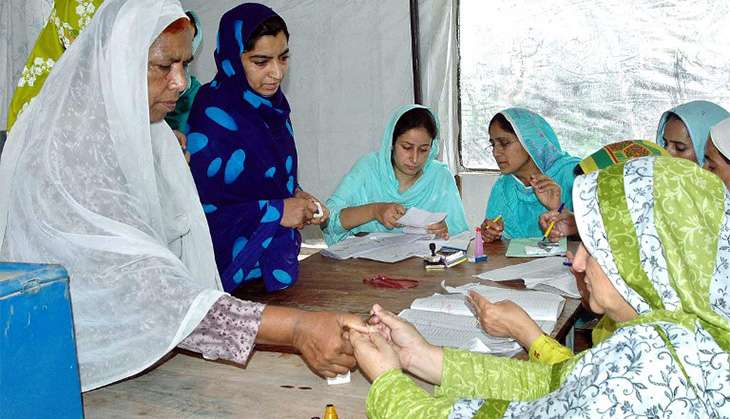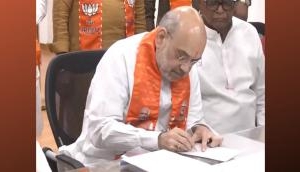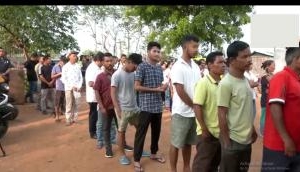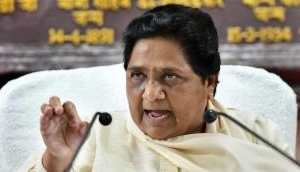The "other Kashmir" : 8 things you need to know about polls in Pak Occupied Kashmir

With the Indian media caught up with the situation in the Kashmir Valley, the elections to the Legislative Assembly taking place today in Pakistan Occupied Jammu and Kashmir (POK or Popularly known as POK) have gone almost unnoticed. This is despite the fact that these elections are being billed as the most fiercely contested ones in the area.
About 400-odd candidates are in the fray to contest the 41 seats of the Legislative Assembly. Of these 41, 29 are in POJK and 12 constituencies in Pakistan (9 in Punjab, 2 in Sindh and one in Peshawar) for the refugees from Jammu and Kashmir- 6 each for Jammu and the Kashmir Valley. The elected house would after its constitution, elect five women on reserved seats and three men on technocrat, overseas Kashmiri and Ulema-Mashaikh seats to complete the 49 member Legislative Assembly.
Also read: Sharif vs Sharif: is Pakistan staring another coup in the face?
In the current Assembly, PPP has 29 seats and is in power, PML-N has 11, Muslim Conference five, MQM two, PTI one and Jamiat Ulema-e-Pakistan one seat.
What is at stake?
There are several significant aspects of the elections.
First, Pakistani political leaders have raised the hype about the J&K issue and India, though the overall flavour of the campaign has been more Pakistan-oriented. With the three major political parties (PPP, PMLN, PTI) using the elections as a platform for their constituencies in Pakistan, local bread and butter issues seem to have taken a back seat.
Second, with Pakistan-based parties entering the fray, local parties like the once dominant Muslim Conference have lost out. People have realised that the local POJK government, despite the high sounding titles of Prime Minister and President and 'Azad', is powerless and all instructions come from and decision get taken in Islamabad. This makes the Pakistan-based parties far more appealing.
Third, if history is any guide, the ruling party in Islamabad and the Punjab have invariably won the POJK elections. The fly in the ointment for the PMLN this time, however, is that the Panama leaks and the absence of Nawaz Sharif from the campaign (Nawaz last visited the area in April) have eroded the election campaign of the PMLN. In contrast, top leaders of PTI, PPP including Imran Khan and Bilawal Bhutto Zardari have been very visible leading the election campaigns of their respective parties.
Fourth, while the campaign has not seen a 'wave' in favour of any party, analysts feel that the PTI has gained prominence due to the tussle between the PPP and the PMLN making it a triangular contest. The PTI has a tie up with the Muslim Conference on 7 to 10 seats that may boost its vote share. Imran Khan has addressed credible election rallies where he has attacked Nawaz Sharif for corruption and alleged that his Kashmir policy was docile and pro-Indian.
Fifth, the PPP by pushing Bilawal into the lead campaigner role has adopted a high-risk strategy since it could well end in failure given the historical record of elections here.
With Asif Ali Zardari being abroad, the credit or otherwise for the party's performance will go to Bilawal. A defeat in the polls will not only cause him personal embarrassment but be the continuation of the retreat of the party since the 2013 polls. A victory or even a decent showing would, however, be a morale booster for him personally and for the party elsewhere.
Also read: Anti-Pakistan protest erupts in Pakistan occupied Kashmir during Nawaz Sharif's US tour
Sixth, with 9 out of the 12 'Refugee' seats in Punjab and the stranglehold of the PMLN in the province, results here would an important indicator of the tenacity of the support base of the Sharifs. If Imran can make a dent here, or even if the PPP can, it would be a big blow to an already beleaguered Nawaz.
Seventh, the MQM had won both the Karachi seats in 2011. This time around, however, the MQM may have a tougher time since the other parties are also in the fray for the two seats and the MQM is on the back-foot vis a vis the Establishment.
Eight, the elections are being held while the incumbent PPP government is still in power and surprisingly, the PTI has not accused it of any pre-poll rigging. In his rallies, Imran Khan has also not criticised the performance of the PPP government. Analysts see this as a move to keep the PPP in good humour for the PTI's larger game-plan against the PMLN government. Imran's main, if not the only target, has been Nawaz Sharif, apart from Kashmir. For its part, the PMLN has also avoided any electoral allegations against the PPP government instead accusing it of corruption and lack of development during its tenure.
What does this mean for India?
For India, two issues are of import. First, a key provision of the electoral law, that has been largely ignored in India, is that any candidate contesting the elections has to sign a declaration that, "I believe in the ideology of Pakistan, ideology of state's accession to Pakistan, and the integrity and sovereignty of Pakistan." Likewise, the Interim Constitution of 1974 lays down that "No person or political party in Azad Jammu and Kashmir shall be permitted to propagate against, or take part in activities prejudicial or detrimental to, the ideology of the state's accession to Pakistan." So much for the right to self-determination that Pakistanis keep shouting about.
Second, all the major parties have indulged in rhetoric on Kashmir. Bilawal Bhuto, for example, while addressing several credible rallies has pledged that he would take back the entire Kashmir from India; accused Nawaz Sharif of "jeopardising the issue of Kashmir by building his associations with the Indian Prime Minister Narendra Modi." He has been chanting slogans like "Modi ka jo yaar hai ghaddar hai, ghaddaar hai. (Anyone who is Modi's friend is a traitor) and ' Modi ke yaar ko aik dhakka aur do" (Modi's friend should be given another push) in his speeches.
Not to be outdone, PMLN's Senator Pervaiz Rasheed declared Nawaz Sharif would resolve the issue of Kashmir and alleviate sufferings of the people of Jammu & Kashmir. He added, "It is imperative to vote the PML-N to power in Azad Kashmir...to strengthen the struggle for the right to self-determination and end miseries of the Kashmiris."
For his part, Imran Khan in addition to asserting that he would resolve the Kashmir issue and raise voice for the rights of Kashmiris at every forum stated, "Kashmiris have rendered sacrifices that no one in this subcontinent has while their brethren in the held valley are facing Indian military involved in human rights violation of every sort."
Given the marginal resonance of the issue in the elections, the only inference is that the rhetoric on Kashmir was a deliberate attempt on the part of all the parties to cosy up with the Army.
The substance of the power-equations between Islamabad and Muzaffarabad are unlikely to change whichever party wins the elections given the stranglehold that the centre has over POJK. What will be of significance, however, is the impact that the victory or loss here for each of the parties has on their fortunes in Pakistan.
The author retired as Special Secretary in the Cabinet Secretariat, Government of India. He tweets as @tilakdevasher1
Also read: Balochistan: caught in a web of corruption
First published: 21 July 2016, 11:20 IST





![BJP's Kapil Mishra recreates Shankar Mahadevan’s ‘Breathless’ song to highlight Delhi pollution [WATCH] BJP's Kapil Mishra recreates Shankar Mahadevan’s ‘Breathless’ song to highlight Delhi pollution [WATCH]](http://images.catchnews.com/upload/2022/11/03/kapil-mishra_240884_300x172.png)

![Anupam Kher shares pictures of his toned body on 67th birthday [MUST SEE] Anupam Kher shares pictures of his toned body on 67th birthday [MUST SEE]](http://images.catchnews.com/upload/2022/03/07/Anupam_kher_231145_300x172.jpg)






